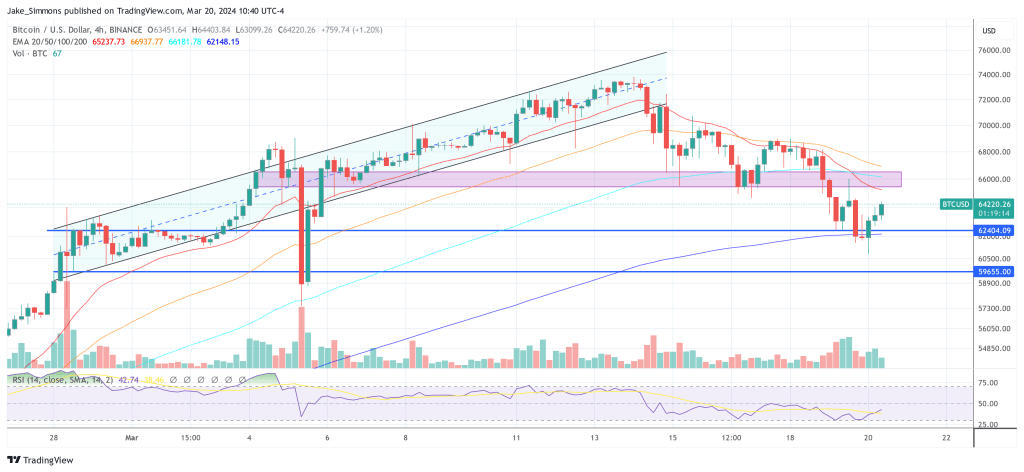Greenpeace USA has unveiled a new shady report alleging close ties between the Bitcoin mining industry and various “climate denialists.” Released on March 19, 2024, the report alleges deep-seated connections between the BTC mining industry and various entities traditionally viewed as opposing progressive climate change policies.
These include conservative think tanks, fossil fuel lobbyists, and climate change skeptics, casting a shadow on the Bitcoin community’s claims of moving towards sustainability.
Greenpeace’s investigation purports to reveal a web of relationships suggesting that, despite public claims of embracing renewable energy and reducing carbon footprints, the mining industry remains entangled with groups and individuals who have historically resisted efforts to combat climate change.
A particularly provocative claim is the purported alignment with networks funded by the conservative Koch brothers and the American Legislative Exchange Council (ALEC), known for their anti-environmental stances and policies deemed anti-democratic.
The report goes further to accuse the Bitcoin mining sector of fostering a “revolving door” phenomenon with the government, especially figures from the former Trump administration, implying an intricate dance of influence and policy manipulation that benefits the mining industry at the expense of environmental progress.
Erik Kojola, a senior researcher at Greenpeace USA, encapsulates the concern, asserting, “Our research uncovered deeper and more extensive connections between proponents of BTC mining and climate deniers than anticipated. The Bitcoin industry is akin to a house of cards that could topple at any time and people are working hard behind the scenes to ensure its longevity through greenwashing and deceit all at the expense of communities and the climate.”
Johanna Fornberg, Greenpeace USA Researcher added that the: “Bitcoin industry groups are caught up in a web that includes some of the most notorious climate denialists. […] Revealing who has power and influence in this industry is essential for holding them accountable for unsubstantiated claims, climate impacts, and harm to local communities.”
Along with the report, Greenpeace USA created an interactive power map that shows the relationships between BTC industry groups, conservative and corporate interest groups, politicians, and other stakeholders highlighted in the report.
Bitcoin Community Reacts
The release of Greenpeace’s Mining for Power report has sparked a robust response from the Bitcoin community, challenging the assertions made and offering a counter-perspective that paints a more complex picture of the industry’s environmental footprint and sustainability efforts.
Daniel Batten, a managing partner at CH4 Capital and an authoritative figure in the environmental analysis of BTC mining, leads the charge in disputing the report’s findings. Batten criticizes Greenpeace for relying on “a very old dataset,” which he argues no longer accurately represents the current state of BTC mining.
According to Batten, a significant portion of the Bitcoin network now relies on sustainable energy sources, a claim backed by recent reports, including a Bloomberg Intelligence analysis from September 2023, which found that Bitcoin has achieved a 52.6% rate of sustainable energy use.
Batten robustly contests the claims about Bitcoin’s carbon footprint, water usage, and alleged strain on electrical grids, citing peer-reviewed research and expert analysis that contradicts Greenpeace’s conclusions. For instance, he references research indicating that mining contributes to grid stability, can lower electricity costs, and may accelerate the transition to renewable energy sources, thereby presenting a narrative of mining as potentially beneficial, rather than detrimental, to environmental sustainability efforts.
The only thing breaking is GreenpeaceUSA’s credibility.
One of the features of GreenpeaceUSA reports is that they are very easy to debunk. You rarely make it past the first paragraph without reading a large swathe of misinformation. This latest report is no exception.
1. “The… https://t.co/ekgUnpuriV
— Daniel Batten (@DSBatten) March 19, 2024
Echoing Batten’s sentiment, the Satoshi Action Fund (SAF), identified by Greenpeace as a prominent advocate for Bitcoin, has utilized the report’s publication as an opportunity to underscore its effectiveness and aggressiveness in promoting Bitcoin advocacy in the USA. Dennis Porter, the founder of SAF, stated via X, “HUGE NEWS: GreenPeace highlights Satoshi Act Fund as the most effective and aggressive Bitcoin advocacy group in the USA.”
HUGE NEWS: GreenPeace highlights @SatoshiActFund as the most effective and aggressive #Bitcoin advocacy group in the USA. https://t.co/5xquoTLb8U pic.twitter.com/UGc9GmPMQg
— Dennis Porter (@Dennis_Porter_) March 20, 2024
Moreover, the Bitcoin community has been further bolstered by a community note from X , which flags Greenpeace’s article for containing outdated information and inaccuracies, especially regarding the energy sources for Bitcoin mining. It states, “The article contains many factual errors, like the flawed per transaction accounting of energy, and outdated and inaccurate information, such as the proportion of fossil fuels used as energy source. Nowadays the majority of the energy used by Bitcoin mining is renewable.”
At press time, BTC traded at $64,220.





